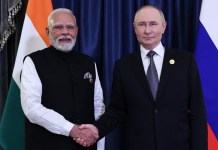In August 2019, Modi-Government abrogated Jammu and Kashmir’s special status with thunderous applause from the Indian Parliament and massive condemnation from Pakistan and the residents of the Kashmir Valley – the Kashmiri Muslims.
Indian Media Wakes-Up After 30 Years To Cover Kashmiri Pandit Genocide
The Kashmiri Pandit (KP) community who were driven-out from the valley in 1989 after outbreak of terrorism celebrated the decision, but many KP’s also questioned the continued use of the persecuted community as a mere political tool.
Experts talking to EurAsian Times stated that the India Government has revived an old policy of instrumentalizing the grief and loss of Kashmiri Pandits in order to give legitimacy to its violence against Kashmiri Muslims. Many Kashmiris including Kashmiri Pandits unequivocally oppose this position of the Government.
Who are the Kashmiri Pandits?
Kashmiri Pandits constitute a minority Hindu community in the Muslim majority Kashmir. In 1989, an armed revolt broke out against the Indian administration and the Kashmiri Pandits were forced to flee the valley after KP’s were specifically targetted for their pro-India stance.
Official accounts put the number of displaced Kashmiri Pandits anywhere between 150,000 to 300,000 individuals but unofficial sources claim the number to be as high as 800,000.
Why Return of Kashmir Pandits is Nearly Impossible Despite All The Hoopla
However, arguments over these numbers often obscure the deeper reality: the ethnic cleansing of the Kashmiri Pandits in the valley. The events of 1989 and those that followed have radically transformed Kashmiri Pandits’ self-understanding and their relationship with the Kashmiri Muslims. They have created a trauma that refuses to be buried and a rage that must be genuinely addressed.
Even for the KP’s who do not live in Kashmir anymore, this rage and trauma are emotional. Kashmir remains ever-present in their lives — in the lotus root and kohlrabi they cook; in the mellifluous Koshur language that binds them intimately not only with one another but also with Kashmiri Muslims; and in their family’s stories about a home in the valley.
Rahul Pandita, co-writer of Shikara, a movie on the exodus of Kashmiri Pandits, recounts how he had witnessed people running after truckloads of relief material such as rice, vegetables, or kerosene oil. Many Kashmiri Pandits including him have kept relief materials like blankets as a reminder of those times. His book “Our moon has blood clots” also tell many such disheartening tales.
A large number of the Kashmiri Pandits sold their ancestral homes when there appeared no sign of being able to return to Kashmir. A conflict that, according to official sources cost 219 lives, losing a family home may not sound like a great loss.
Kashmiri Muslims Responsible for Exodus of Pandits; Not Jagmohan: Top Kashmiri Journalist
Nevertheless, it does embody the loss of much more than mere property. It is the loss of an identity, a history, one that many Kashmiri Pandits see as being deliberately taken from them. The current government accuses the congress party and its allies to have had buried Kashmir’s identity in 1989.
Ever since 1989, the New Delhi has tried to cash in on precisely this sense of loss and erasure that prevails among the Kashmiri Pandits. Rather than treating Kashmir as a political matter, the Indian governments have consistently turned it into a communal one. They have fuelled Kashmiri Pandits’ experience of injustice by pitting Pandit and Muslim suffering against each other.
The Indian government can be seen to deploy the imperialistic techniques of divide and rule in Kashmir. Such strategies were present during both the pre-colonial and post-colonial period. Not just the BJP but the Congress party — now part of India’s opposition — also played its part in systematically eroding Kashmir’s constitutional autonomy, rigging elections and splintering the political field.
Are Drugs, Money and Religion Driving Stone Pelting in Kashmir?
It is the BJP, however, that has managed to push them to a precipice. It is using the Kashmiri Pandit exodus along with arguments about “development,” to legitimise the annexation of Jammu and Kashmir and to instate one of India’s most severe sieges.
Given this historical backdrop, it should not come as a surprise that the situation of the Pandit exodus has never been properly looked into. It’s no wonder that Pandits feel so much rage and lack of acknowledgement, even though consecutive governments claim to champion their cause, but without any results.
To break out of one’s pain and suffering is difficult when that trauma remains bodily and psychically unprocessed, as has been the case for many Kashmiri Pandit families. Governments capitalise on this trauma with the intent of maintaining territorial sovereignty at the cost of human lives, political freedom and reconciliation.
Experts Demand Recognition, Nobel Peace Prize For Kashmiri Pandits For Their Colossal Restraint
It should be understood that to address intergenerational Kashmiri Pandit pain is not through the oppression of Kashmiri Muslims. Kashmiri Pandits were wronged but that does not form bases for the Kashmiri Muslims to go through cruel experiences.
One of the most enduring accepted narratives around the Kashmiri Pandit exodus in the 1990s is that they were “driven out” by their Muslim neighbours as the armed militancy took off. This is a narrative that has displaced every other analysis of these tragic departures, portraying Kashmiri Pandits as the only and exclusive victims in this violent modern history of Kashmir, even as Kashmiri Muslims have in their turn suffered violent crackdowns, enforced disappearances, arbitrary detentions, and a general devaluation of every form of political power, including the right to protest their oppressive conditions in their own land.
Al-Jazeera Criticises NYT Editorial on Kashmir Dispute; Kashmiri Pandits Ask Counter Questions
As a result, many advocates for separate colonies for Pandits returning to Kashmir, presumably to secure them from their Kashmiri Muslim neighbours. This vision entails that Pandits would have to live behind fortified walls and securitised encampments.
Instead of this, Kashmiri Pandits everywhere should think about how to envision an ethical and dignified return to their homeland that is not built on the notions of segregation, seclusion, and apartheid.
The relocation of Kashmiri Pandits in the Kashmir valley needs to give them not only a sense of security but also a practical sense of belonging to the land of Kashmir which can only be achieved by a mutual sense of understanding between Kashmiri Pandits and Kashmiri Muslims.
The task ahead for Kashmiris is to change the narrative that they have inherited. For tens of years, the loss and suffering of Kashmiri Pandits and Muslims have been treated with a communal agenda rather than resolving it.
Why Kashmiri Pandits and Muslims Can Never Be Friends Again – OpEd
Kashmiris need to stop festering their wounds. Now, more than ever, young Kashmiris need to chart a path towards reconciliation, solidarity and partnership with one another.
Many Kashmiri Pandits have unified to stand together in solidarity with the Muslim majority women’s protest going on at Shaheen Bagh, New Delhi. Experts talking to EurAsian Times put it as – This shows that it is imperative to actively seek out one another’s truths and stories; resist statist manipulations of their suffering; read deeply and widely into Kashmir’s complex history; call out bigotry and animosity in their families, and reimagining the Kashmiri political community in a way that accommodates and celebrates difference without simply being reduced to wrestling identity claims.
Reaching beyond oneself may feel like a betrayal to their respective communities. However, it is not. It is the only path to their collective healing and deliverance. Peace can only prevail in the valley if peace is alike for every community.
Does Not Reflect the Views of the EurAsian Times.




